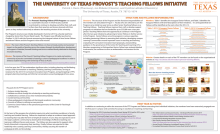Peer Learning Assistant Program Guidelines and Curricula
The Peer Learning Assistant Program within the Department of Chemistry is a program developed with resources from the Provost Teaching Fellows program to enhance the educational experience of students taking general chemistry by training and employing Peer Learning Assistants (PLAs) to service large blended general chemistry courses. The large (300 –500 students) blended courses have replaced the straight lecture model with active, student centered, learning. Active learning requires coaching and in a large class it is impossible to implement with only one instructor and one teaching assistant. The PLAs are deployed to these classrooms and serve as learning coaches. This class can be improved upon by integrating the leadership and ethics component of the course with the day-to-day work and content of the course. When a student is serving in a leadership capacity to another student, that student is practicing professional behaviors that will translate into other classes and life beyond the University. The PLA program developed through this project continues today in the form of the Ethics flagged course, CH372C. Hundreds of PLAs serve thousands of general chemistry students every year. Pre and post general chemistry concept assessments showed large gains for students participating as the PLAs. So, not only are they gaining leadership and pedagogy skills, they are also deepening their chemistry content knowledge. The program has been replicated in the biology department. Active learning at scale would not be possible without the support of well trained learning assistants, as such this project continues to impact the teaching mission of the University.
Impacts from This Initiative

Active Learning at Scale: Lessons from General Chemistry (National Chemistry Education Meeting)
In 2016 Cythia LaBrake presented about her PTF Initiative in a poster session of the National Chemistry Education Meeting. Her presentation was titled "Active Learning at Scale: Lessons from General Chemistry."
View the poster in larger format here.

UT Provost’s Teaching Fellows Initiative (De Lange Conference, Rice University)
More than a dozen of the country’s leading education experts met at Rice University October 13-14, 2014 for the biennial De Lange Conference, “Teaching in the University of Tomorrow.” This conference was presented in collaboration with Scientia, an institute for the history of science and culture, and the Center for Teaching Excellence at Rice University.

